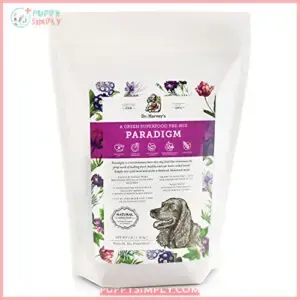This site is supported by our readers. We may earn a commission, at no cost to you, if you purchase through links.

Choose unsalted, sugar-free, xylitol-free varieties and serve sparingly. Even natural peanut butter contains sugars that can affect your pup’s blood glucose levels.
Think of it as an occasional treat, not a daily snack – even a tablespoon can impact your dog’s carefully balanced insulin routine. The protein and healthy fats won’t cause dramatic spikes like processed versions loaded with corn syrup.
Always consult your vet first, as they’ll provide personalized guidance based on your dog’s specific condition and medication schedule. The right approach transforms this beloved treat from risky to manageable.
Table Of Contents
- Key Takeaways
- Can Diabetic Dogs Eat Peanut Butter?
- Understanding Diabetes in Dogs
- Can Diabetic Dogs Have Treats?
- What is Canine Diabetes?
- Symptoms of Dog Diabetes
- What Not to Feed a Diabetic Dog
- What to Feed a Diabetic Dog: Before You Go
- Diabetes in Dogs: What You Need to Know
- How Does Peanut Butter Affect Diabetic Dogs?
- Is Peanut Butter Safe for Diabetic Dogs?
- Importance of Diet for Diabetic Dogs
- Can Diabetic Dogs Eat Meat?
- Meats to Avoid for Diabetic Dogs
- Other Meats Suitable for Diabetic Dogs
- Suitable Treats for Diabetic Dogs
- Chews and Toys for Diabetic Dogs
- Safe Vegetables for Diabetic Dogs
- Can Diabetic Dogs Eat Fruit?
- Other Human Foods for Diabetic Dogs
- Supplements for Diabetic Dogs
- Joint Supplements for Diabetic Dogs
- Consulting Your Vet for Diabetic Dogs
- Favorite Diabetic-Safe Snacks for Dogs
- Frequently Asked Questions (FAQs)
- Does peanut butter raise blood sugar in dogs?
- What can I cook for my diabetic dog?
- What are some safe and suitable treats for diabetic dogs?
- Can diabetic dogs eat fruits and vegetables?
- Are there any specific meats that diabetic dogs should avoid?
- What are some recommended joint supplements for diabetic dogs?
- How much peanut butter can diabetic dogs have?
- What peanut butter brands are safest for diabetics?
- Does peanut butter timing affect insulin schedules?
- Conclusion
Key Takeaways
- Choose the right type: Select natural, unsalted, sugar-free peanut butter that’s completely xylitol-free, as xylitol can be deadly for dogs and added sugars will spike blood glucose levels.
- Practice strict portion control: Limit servings to no more than 1 teaspoon per 20 pounds of body weight and offer only as an occasional treat, not a daily snack.
- Time it with insulin schedules: Give peanut butter within an hour of regular meals when insulin is administered to prevent dangerous blood sugar fluctuations.
- Monitor your dog’s response: Always consult your vet first and watch for any changes in blood glucose levels, digestive issues, or allergic reactions when introducing peanut butter to their diet.
Can Diabetic Dogs Eat Peanut Butter?
Deciding whether your diabetic dog can enjoy peanut butter requires careful consideration of ingredients and portion sizes.
While natural peanut butter can be safe in small amounts with veterinary approval, many commercial varieties contain added sugars that can spike blood glucose levels dangerously, making sugar-free an important consideration.
Ketona Chicken Recipe Dog Food

When managing canine diabetes, your dog’s nutritional foundation matters more than ever.
Ketona Chicken Recipe Dog Food delivers exceptional results for diabetic dogs with its ultra-low carbohydrate content—containing 85% fewer carbs than competing grain-free brands.
This specialized recipe features over 46% protein from non-GMO, antibiotic-free American chicken, helping maintain stable blood sugar levels.
With less than 5% total digestible carbohydrates, it’s specifically designed for ideal diabetic dog nutrition and food safety.
Diabetic dogs require careful consideration of peanut butter safety to avoid harmful ingredients.
Paradigm Green Superfood Dog Food

While managing your diabetic dog’s diet, you’ll find that Paradigm Green Superfood Dog Food offers excellent nutrient balance without containing peanut butter.
This grain-free option provides superfood benefits through six dehydrated vegetables, making it ideal for canine diabetes management.
The formula eliminates common food allergies triggers like wheat, corn, and soy while supporting proper dog nutrition.
Simply add hot water, protein, and oil to create balanced meals.
This green food approach helps maintain stable blood sugar levels in diabetic dogs while avoiding the complications that natural peanut butter might introduce to their carefully controlled dog diet.
It’s vital to recognize the risks of xylitol toxicity and follow proper peanut butter guidelines to guarantee a safe and healthy treat for your dog.
Blue Buffalo Small Breed Dog Food

Blue Buffalo Small Breed Dog Food offers breed-specific nutrition, but you’ll need to check ingredients carefully for your diabetic pup.
Some varieties contain peanut butter, which isn’t ideal for managing dog diabetes due to high fat content and potential added sugars.
When comparing pet food options, look for these features:
- Xylitol free formulations (this sweetener is toxic to dogs)
- Natural peanut butter ingredients without added sugars
- Low glycemic index carbohydrates
- High fiber content for blood sugar stability
- Moderate protein levels suitable for small breeds
Always consult your vet before switching foods, especially when managing canine dietary restrictions. It’s vital to understand the peanut butter risks associated with dog diabetes to make informed decisions about managing canine diabetes and choosing the right food for your diabetic pup with high fiber content.
Hill’s Science Diet Adult Light Dog Food

Hill’s Science Diet Adult Light Dog Food offers excellent weight management support for your diabetic pup, but adding peanut butter requires careful consideration.
This formula contains L-carnitine to promote healthy body weight and heart function, making it ideal for canine diabetes management and pet obesity prevention.
However, peanut butter’s high fat content can interfere with your dog’s low sugar dietary needs.
Natural, unsweetened varieties might work occasionally, but commercial versions often contain added sugars that spike blood glucose levels.
Food allergies can also complicate diabetic dog care, so monitor your pet closely.
Your veterinarian should approve any peanut butter treats to guarantee proper canine wellness and nutrition balance.
It’s vital to understand the xylitol poisoning risk when selecting a peanut butter for your dog.
Understanding Diabetes in Dogs
Diabetes represents a challenging journey that transforms your dog’s daily routine forever.
When your pet’s pancreas can’t produce enough insulin or their body resists insulin therapy, blood sugar levels spike dangerously high.
This metabolic disruption affects how your dog processes nutrients, making canine nutrition a critical battleground in diabetes management.
Diabetes causes stem from various factors including genetics, obesity, and autoimmune responses that damage insulin-producing cells.
Without proper dog diabetes treatment, your furry friend faces serious complications like blindness, kidney damage, and life-threatening ketoacidosis.
Key aspects of canine diabetes management include:
- Regular insulin levels monitoring through blood glucose testing
- Structured meal schedules that sync with insulin injections
- High-fiber, low-sugar diets that prevent blood sugar spikes
You’ll discover that diabetes in dogs isn’t a death sentence—it’s a manageable condition.
With consistent care, proper medication, and smart food choices (yes, even occasional peanut butter treats), your diabetic dog can live a full, happy life.
Can Diabetic Dogs Have Treats?
You can give your diabetic dog treats, but you’ll need to choose them carefully to avoid dangerous blood sugar spikes.
The key difference between regular and diabetic dog treats lies in their ingredients – diabetic-friendly options contain low glycemic ingredients, minimal simple carbohydrates, and avoid added sugars that can cause glucose fluctuations.
Difference Between Regular and Diabetic Dog Treats
Regular dog treats can sabotage your diabetic dog’s health with hidden sugars and high-carb ingredients.
The stark difference between standard and diabetic dog treats lies in their formulation—regular treats typically contain up to 50% carbohydrates from flour and starches, while diabetic treats keep carbs under 20%.
Key differences in treat comparison include:
- Carbohydrate content: Regular treats use fast-digesting starches that spike blood sugar; diabetic treats utilize low-glycemic ingredients
- Protein levels: Diabetic treats contain up to 40% protein versus 20% in regular treats
- Fiber content: Diabetic options provide 10-20% fiber to slow glucose absorption
- Sugar additives: Regular treats often contain corn syrup; diabetic treats eliminate added sugars
- Fat composition: Diabetic treats minimize unhealthy fats to reduce insulin resistance
- Calorie control: Diabetic treats specify portion sizes and calorie counts per piece
- Ingredient transparency: Diabetic treats feature clean labels with whole-food sources
Diabetic dog owners should research diabetic dog options carefully to guarantee the best health outcomes.
This nutritional approach to dog nutrition supports proper canine diabetes management while still providing healthy snacks your pet will enjoy.
Ingredients to Look for in Diabetic Dog Treats
When selecting dog treats for diabetes mellitus management, you’ll want to prioritize specific ingredients that support stable blood sugar levels.
Choose treats with high protein sources and fiber content while avoiding anything with added sugars or high carbs.
Key ingredients to seek out:
- Sugar free formulations that won’t spike glucose levels like xylitol-free peanut butter options
- Nutrient balance focusing on lean proteins and complex carbohydrates for sustained energy.
Always verify treats support your canine diabetes management plan through veterinary guidance.
What is Canine Diabetes?
Understanding what’s happening inside your dog’s body starts with grasping the basics of canine diabetes. This metabolic disorder occurs when your pet’s pancreas can’t produce enough insulin or when their body becomes resistant to insulin’s effects. Think of insulin as a key that opens cells to let blood sugar enter for energy.
When this system breaks down, glucose accumulates in the bloodstream instead of fueling your dog’s organs. This creates the telltale diabetes symptoms you’ll notice:
- Excessive drinking that has you refilling water bowls constantly
- Frequent urination accidents even in house-trained dogs
- Unexplained weight loss despite normal or increased appetite
- Lethargy that replaces your pup’s usual enthusiasm
Diabetes mellitus affects blood sugar levels throughout the day, requiring careful management through insulin therapy and dietary control to maintain your dog’s canine health.
Symptoms of Dog Diabetes
Recognizing diabetes symptoms early helps you get your dog the care they need before complications develop.
You’ll notice increased thirst and urination, unexplained weight loss, and changes in appetite as the most common warning signs, which can help you identify diabetes symptoms.
Peanut Butter and Blood Sugar
Peanut butter’s low Glycemic Index of 14 means it won’t spike your dog’s blood sugar like other treats.
With a glycemic index of just 14, peanut butter offers stable blood sugar control for your diabetic pup.
However, commercial brands often contain added sugars that disrupt glucose monitoring and canine blood sugar control.
For effective dog diabetes management, choose unsweetened varieties and monitor your pet’s response.
Always coordinate peanut butter treats with Insulin Therapy timing for ideal Sugar Control.
Safety of Peanut Butter
While peanut butter has a low glycemic index, several safety concerns exist for your diabetic dog.
Xylitol toxicity poses the most serious risk, as this artificial sweetener can cause hypoglycemia and liver failure.
High fat levels may trigger pancreatitis, while added sugars create blood glucose spikes.
Monitor for allergic reactions and digestive issues when introducing peanut butter to your dog’s diet.
Choosing Diabetic-friendly Peanut Butter
When you’re ready to offer peanut butter as a treat, selecting the right type makes all the difference for your dog’s health.
Natural, unsweetened varieties without added sugars provide the safest option for diabetic dogs.
- Check labels carefully – Look for "no sugar added" and verify xylitol free ingredients
- Choose natural brands – Pure peanut products without hydrogenated oils or preservatives
- Prioritize healthy fats – Natural peanut oils support nutrient balance without blood sugar spikes
- Select low glycemic options – Sugar free options maintain stable glucose levels
- Confirm peanut butter safety – Consult your vet before introducing any new treat
What Not to Feed a Diabetic Dog
Knowing what foods can harm your diabetic dog helps you keep them healthy and happy.
Some foods act like hidden landmines for diabetic dogs, causing dangerous blood sugar spikes or other serious health problems.
Here are four Toxic Foods and ingredients that pose Sugar Risks to diabetic dogs:
- High Carbs like white bread and pasta – These foods convert quickly to glucose, creating dangerous blood sugar roller coasters that can lead to diabetic emergencies.
- Peanut butter with added sugars or xylitol – While plain peanut butter can be okay, sweetened versions contain hidden sugars that wreak havoc on dog diabetes management.
- Processed Meats and Bad Fats like bacon or sausage – These Processed Meats are loaded with sodium and unhealthy fats that strain your dog’s system and complicate their canine diabetes diet.
- Sweet treats containing molasses, fructose, or dextrose – These ingredients spike blood glucose faster than you can say "sit," making dog dietary restrictions absolutely necessary for proper diabetes control.
What to Feed a Diabetic Dog: Before You Go
Managing your dog’s diabetes effectively starts with understanding what foods support stable blood sugar levels.
Now that you know what to avoid, let’s focus on building a solid foundation for your diabetic dog’s daily nutrition and long-term health success.
Proper Diabetic Dog Nutrition centers on consistent meal timing and careful ingredient selection.
You’ll want to establish regular feeding schedules that align with insulin administration while choosing foods that won’t spike glucose levels.
Key feeding strategies include:
- Picture your dog enjoying lean chicken breast paired with fiber-rich vegetables like steamed broccoli
- Imagine measuring precise portions of low-glycemic treats that satisfy without compromising blood sugar control
Meal Timing
- 2-3 meals per day
- Consistent times throughout the day
Protein Sources
- Lean meats such as chicken and turkey
Safe Vegetables
- Broccoli
- Celery
Fruit Options
- Apples
- Bananas
- Avoid high-sugar fruits such as mangoes or peaches
Diabetes in Dogs: What You Need to Know
When your dog receives a canine diabetes diagnosis, understanding the condition becomes your first priority for successful management.
Diabetes mellitus affects how your pet’s body processes glucose, leading to elevated blood sugar levels that require careful monitoring and treatment.
Diabetes Symptoms you’ll need to watch for include:
- Increased thirst and urination, weight loss despite normal appetite, lethargy, and sweet-smelling breath that signals your dog needs immediate veterinary attention.
Canine Nutrition plays a vital role in Diet Management, focusing on high-fiber, low-carbohydrate meals that prevent Blood Sugar spikes.
Your veterinarian will likely recommend Insulin Therapy alongside dietary changes to help regulate glucose levels effectively.
Dog Blood Sugar Monitoring becomes part of your daily routine, with normal levels ranging from 80-120 mg/dl.
Diabetic Dogs typically require two insulin injections daily, timed with meals to optimize glucose control.
Dog Diabetes Management involves consistent meal timing, appropriate treat selection, and regular veterinary check-ups.
With proper Canine Diabetes care, your dog can live a healthy, symptom-free life for years.
How Does Peanut Butter Affect Diabetic Dogs?
Understanding how peanut butter affects diabetic dogs requires examining its unique nutritional profile and metabolic impact. Peanut butter effects on canine health stem from its low glycemic index of 14, meaning it releases sugar slowly into your dog’s bloodstream.
This gradual release supports better blood sugar control compared to high-glycemic treats. The protein and healthy fats in peanut butter can actually help stabilize glucose levels when used properly in dog diabetes management.
However, the high fat content poses risks – excessive amounts may trigger pancreatitis in diabetic dogs. Dog nutrition experts emphasize that timing matters too, as fatty foods can delay gastric emptying and affect insulin absorption.
Dietary management success depends on moderation. While peanut butter won’t spike blood sugar like simple carbohydrates, it shouldn’t become a regular part of your dog’s diet.
- Smart portion control: Never exceed 1 teaspoon per 20 pounds of body weight to maintain ideal canine diabetes management without overwhelming your pet’s system.
Is Peanut Butter Safe for Diabetic Dogs?
The short answer? Yes, but with careful consideration. Peanut butter can be safe for diabetic dogs when you choose the right type and control portions strictly.
Natural, sugar-free peanut butter without xylitol poses minimal peanut butter risks for most diabetic dogs. The healthy fats and protein actually support stable blood sugar control, making it a better choice than many commercial treats.
However, you’ll want to stick to tiny amounts – think teaspoon-sized portions rather than spoonfuls. Always check labels for hidden sugars and artificial sweeteners.
Xylitol, commonly found in sugar-free alternatives, can be deadly for dogs. Look for products with only peanuts and maybe salt listed.
The high fat content means moderation is key for proper dog diabetes management. Too much can trigger pancreatitis, especially problematic for dogs already managing canine diabetes.
Your best bet? Consult your vet before introducing peanut butter into your dog’s routine. They’ll help you determine if it fits your dog’s specific nutritional value needs and current treatment plan.
Importance of Diet for Diabetic Dogs
Managing your diabetic dog’s diet isn’t just important—it’s absolutely critical for their health and survival.
The right nutrition plan works alongside insulin therapy to keep blood sugar levels stable and prevent life-threatening complications, making it a vital part of their overall care and survival.
Diabetic Dogs’ Insulin and Meal Schedule
With diabetic dogs, timing is everything in the context of insulin injections and meals. You’ll need to coordinate these carefully to maintain stable blood sugar levels throughout the day.
Most diabetic dogs require insulin timing within 30 minutes of their main meals, typically twice daily at 12-hour intervals. Your feeding schedule should remain consistent—don’t vary meal times by more than 30 minutes daily.
This reliability prevents dangerous blood glucose swings that could lead to hypoglycemia or hyperglycemia. Meal frequency typically involves two evenly spaced meals that sync with your canine insulin injections routine.
Diet planning becomes vital since meal composition directly affects insulin needs. High-fiber foods slow glucose absorption, supporting better pet blood glucose control. Never delay meals after giving insulin, as this creates serious risks.
Regular blood sugar monitoring helps you fine-tune this schedule with your vet’s guidance for effective dog diabetes management.
Nutritional Needs of Diabetic Dogs
Proper nutrient balance forms the foundation of effective dog diabetes management.
Your diabetic dog needs high fiber content to slow glucose absorption, lean protein sources for stable energy, and healthy fats in moderation.
Carbohydrate management becomes your biggest ally—choose low-glycemic options while avoiding simple sugars.
This careful approach to canine nutritional needs helps maintain steady blood sugar levels.
Even treats like peanut butter require scrutiny for sugar content and portion control within your dog’s dietary restrictions.
Managing diabetic dog conditions often involves researching special diabetic dog food options to guarantee the best outcomes, including stable energy and steady blood sugar levels with proper nutrient balance.
Can Diabetic Dogs Eat Meat?
Your dog’s protein needs don’t disappear with diabetes – they actually become more important for maintaining stable blood sugar levels.
High-quality meat serves as an excellent foundation for canine diabetes management since protein doesn’t spike glucose like carbohydrates do.
When selecting meat for your diabetic pup, you’re looking for lean options that won’t add unnecessary fat to their diet.
Think of protein as your dog’s steady friend – it provides sustained energy without the blood sugar rollercoaster.
Here are five top meat choices for diabetic dogs:
- Skinless chicken breast – Low fat, high protein powerhouse
- Lean ground turkey – Easy to digest and portion control
- White fish like cod or tilapia – Omega-3 rich with minimal fat
- Beef liver – Vitamin-packed organ meat in small amounts
- Lean cuts of beef – Remove visible fat before serving
Raw meat poses risks for any dog, but diabetic dogs need extra caution since their immune systems may be compromised.
Always cook meat thoroughly without seasonings, oils, or butter.
These protein sources support your dog’s nutritional requirements while keeping their diabetes in check.
Meats to Avoid for Diabetic Dogs
Several meats can complicate dog diabetes management and should be avoided in your pet’s diet. Processed meats like bacon, hot dogs, and sausages contain preservatives and excessive sodium that can worsen blood sugar control. These products often hide added sugars that spike glucose levels unexpectedly.
High fat meats including fatty cuts of beef, pork, and lamb present serious risks for diabetic dogs. The excess fat can trigger pancreatitis, a dangerous condition that’s especially concerning for dogs with canine diabetes diet restrictions.
Raw meat poses additional bacterial contamination risks that stressed diabetic immune systems can’t handle effectively. Organ meats like liver and kidneys contain concentrated nutrients that can overwhelm a diabetic dog’s system. While nutritious for healthy dogs, they’re too rich for diabetic dog treats or regular meals.
Smoked fish, despite seeming healthy, typically contains high sodium levels that interfere with proper hydration and blood pressure management. These dog nutritional restrictions aren’t meant to limit your pet’s enjoyment—they’re safeguards ensuring stable glucose levels and long-term health success, providing a way to manage canine diabetes diet restrictions and prevent conditions like diabetic immune systems from being compromised, and ultimately supporting long-term health and preventing bacterial contamination risks, all of which are crucial for dog diabetes management.
Other Meats Suitable for Diabetic Dogs
Beyond poultry, your diabetic pup can enjoy several protein-rich options that won’t spike blood sugar.
Turkey Meals make an excellent choice – this lean protein packs muscle-building nutrients without excess fat that could trigger pancreatitis.
Fish Diets offer omega-3 fatty acids for anti-inflammatory benefits.
Salmon, cod, and whitefish work well when properly cooked and deboned.
These swimming superstars support your dog’s overall health while maintaining stable glucose levels.
Beef Alternatives include lean cuts like sirloin or ground beef with visible fat removed.
Cook thoroughly without seasonings, oils, or butter.
Lamb Choices work similarly – select lean portions and prepare simply.
All meats should complement your dog diabetes diet plan.
While you’re considering peanut butter and dog safe nut butters for treats, these protein sources provide foundational nutrition.
Remember that canine diabetes management requires consistency – introduce new proteins gradually while monitoring blood glucose.
Your vet can help adjust insulin accordingly, ensuring these dog nutritional alternatives support rather than complicate your furry friend’s health journey.
Suitable Treats for Diabetic Dogs
Finding the right diabetic snacks for your furry friend doesn’t have to feel like traversing a minefield. When managing canine diabetes, suitable treats for diabetic dogs require careful consideration of blood sugar impact and nutritional value.
Peanut butter can work as a healthy reward for diabetic dogs, but you’ll need to choose wisely. Its low glycemic index means it releases sugar gradually, helping maintain stable glucose levels. However, sugar-free options are essential—avoid any product containing xylitol, which is toxic to dogs.
Low carb foods make excellent diabetic snacks. Fresh vegetables like carrots, broccoli, and green beans provide satisfying crunch without glucose spikes. Lean proteins such as plain boiled chicken offer high-value rewards that support proper dog nutrition.
For successful canine diabetes management, follow these guidelines:
- Choose commercial diabetic dog treats specifically formulated to be low in sugar and carbohydrates
- Make homemade treats using diabetic-friendly ingredients like unsweetened pumpkin and oats
- Always introduce new treats gradually while monitoring blood glucose levels
Remember, moderation is key—treats should comprise less than 10% of daily nutrients. Diabetic dog owners can explore diabetic dog options to find the best snacks for their pets.
Chews and Toys for Diabetic Dogs
In the domain of dog diabetes management, selecting appropriate chews and toys requires careful consideration of your diabetic pup’s unique needs.
Unlike sugar-laden treats, Durable Chews and Interactive Toys won’t spike blood glucose levels while keeping your furry friend engaged. Choose sugar free options that prioritize Chew Safety—avoid items with artificial sweeteners like xylitol, which can be deadly.
| Chew Type | Benefits | Safety Considerations |
|---|---|---|
| Dental Chews | Improves Dog Dental health, reduces plaque | Choose low-calorie, sugar-free varieties |
| Rope Toys | Mental stimulation, teeth cleaning | Supervise to prevent ingestion of fibers |
| Puzzle Toys | Interactive mental exercise | Make certain no small parts can break off |
| Antler Chews | Long-lasting, natural option | Monitor for splintering or sharp edges |
| Rubber Toys | Durable, dishwasher safe | Select appropriate size to prevent choking |
Remember, even peanut butter-filled toys should follow canine dietary restrictions—opt for sugar-free varieties or skip the filling entirely to maintain proper sugar content control.
Safe Vegetables for Diabetic Dogs
Vegetables can be excellent diabetic-friendly treats for your dog when chosen carefully. These low-calorie, nutrient-rich options help satisfy your pet’s cravings while supporting stable blood sugar levels.
Carrots
Carrots are excellent dog snacks for diabetes management thanks to their low glycemic index and natural carrot benefits.
Fresh carrots provide safe nutrition without spiking blood sugar levels, making them ideal for canine dietary restrictions.
Here’s why raw carrots work well:
- Carrot nutrition includes beta-carotene for eye health
- Low carbohydrates prevent glucose spikes unlike peanut butter
- Natural fiber aids digestion and blood sugar control
- Crunchy texture satisfies chewing needs as dog treat ingredients
Broccoli
Broccoli stands out as an excellent vegetable choice for your diabetic dog.
This cruciferous powerhouse delivers fiber and vitamin C while maintaining minimal impact on blood sugar levels.
Rich in antioxidants, broccoli supports your dog’s overall metabolic health without causing glucose spikes.
Steam it lightly to preserve nutrients and make digestion easier for your furry friend, which is crucial for maintaining your dog’s metabolic health.
Sweet Potatoes
Sweet potatoes occasionally serve as beneficial treats for diabetic dogs when cooked and portioned carefully.
Their moderate glycemic index and high fiber content support stable blood sugar levels. However, carbohydrate content requires portion control to prevent glucose spikes.
Always consult your veterinarian before adding sweet potatoes to your dog’s diabetes management plan for maximum safety.
Potatoes
Regular potatoes aren’t the best choice for your diabetic dog.
White potatoes are generally discouraged due to their high starch content and glycemic index, which can cause blood sugar spikes.
Unlike sweet potatoes that offer some nutritional benefits, regular potatoes lack essential nutrients needed for effective dog diabetes management and should be avoided in your canine dietary restrictions plan, considering their impact on blood sugar and overall diabetes management.
Celery
Looking beyond potatoes, celery offers another excellent vegetable choice for your diabetic dog.
This crunchy snack provides fresh sticks that serve as healthy chews without compromising blood sugar control.
- Low calorie content supports weight management in dog diabetes management
- High fiber aids digestion and helps stabilize glucose levels
- Natural crunch satisfies your dog’s need for textural variety in green treats
Celery’s minimal impact on blood sugar makes it ideal for dogs with dietary restrictions, offering an invigorating alternative to traditional dog treats while supporting overall canine health.
Can Diabetic Dogs Eat Fruit?
While fresh fruit can be a healthy treat for many dogs, diabetic dogs need careful consideration due to natural sugars that can affect blood glucose levels.
You’ll want to choose low-glycemic fruits in small portions and always monitor your dog’s response to any new food additions, ensuring a safe and healthy treat.
Apples
With their fiber and lower sugar content, apples make excellent treats for your diabetic dog.
Remove seeds and core first—they’re toxic. The dietary fiber helps slow glucose absorption, preventing blood sugar spikes that complicate diabetes management.
Apple nutrition offers vitamins while supporting healthy snacks for pet safety. These fruit benefits align perfectly with canine health needs when managing dog diabetes through proper dog treats selection, focusing on diabetic dog care and proper dog treats.
Bananas
You’re right to avoid bananas for your diabetic dog.
These tropical treats pack high natural sugars that can spike blood glucose levels dangerously.
Their carbohydrate content complicates diabetes management, making blood sugar control harder.
Key banana nutrition concerns for diabetic dogs:
- High sugar content causes rapid glucose spikes
- Elevated carbohydrates disrupt insulin balance
- Natural fructose adds unnecessary complications to canine diabetes diet
- Better fruit alternatives exist for healthy snacks
Skip bananas entirely—your pup’s pancreas will thank you for choosing safer dog treat safety options instead, as they help maintain blood sugar control and support a healthy canine diabetes diet.
Watermelon and Strawberries
These summer treats offer rejuvenating options for your diabetic dog, but moderation matters most.
Both fruits contain natural sugars that can affect blood glucose levels, so portion control prevents unwanted spikes.
| Fruit | Benefits | Precautions |
|---|---|---|
| Watermelon | High water content for hydration | High glycemic index requires tiny portions |
| Strawberries | Rich in vitamin C and fiber | Monitor for strawberry allergies |
| Both Fruits | Antioxidants support overall health | Summer treats shouldn’t exceed 10% daily calories |
| Serving Size | 1-2 small pieces maximum | Remove seeds to prevent choking |
| Monitoring | Check blood sugar after feeding | Discontinue if digestive upset occurs |
Always introduce new fruits gradually while monitoring your dog’s response.
These berry benefits and watermelon nutrition can complement your dog diabetes management plan when used sparingly under veterinary guidance.
Blueberries
Blueberries make an excellent choice for diabetic dogs thanks to their impressive antioxidant benefits and low sugar content.
These tiny powerhouses pack canine antioxidants that support overall health while maintaining stable canine glucose levels.
Unlike higher-sugar fruits, blueberries won’t spike your dog’s blood sugar when given in moderation.
Their berry nutrition profile includes fiber and vitamins without excessive natural sugars.
Always monitor for fruit allergies when introducing new treats, and remember that even diabetic-friendly options like blueberries should complement proper dog diabetes management rather than replace balanced nutrition.
Blueberries are a great example of how certain foods can provide canine antioxidants and support overall health.
Their low sugar content and nutritional profile make them a suitable treat for diabetic dogs, as long as they are given in moderation.
Pumpkin
This nutritious gourd serves as a fantastic treat alternative for diabetic dogs.
Pumpkin’s high fiber content slows glucose absorption, while its low glycemic index prevents blood sugar spikes that complicate diabetes management.
- Canned pumpkin (not pie filling) provides consistent fiber content for blood sugar regulation
- Pumpkin puree offers essential vitamins A and C without added sugars
- Dog nutrition benefits include digestive support and healthy weight maintenance for diabetic management
Other Human Foods for Diabetic Dogs
Beyond the basics of meat and vegetables, you might wonder about other everyday human foods your diabetic dog can safely enjoy.
Let’s explore some common household items like eggs, rice, cheese, and peanut butter to help you make informed choices for your furry friend.
Eggs
Eggs offer excellent nutrition for diabetic dogs.
They’re packed with high-quality protein and don’t raise blood sugar levels, making them ideal for diabetes management.
You can serve boiled eggs or scrambled eggs without butter or oil.
Egg benefits include supporting muscle health while providing essential amino acids.
Always introduce new foods gradually and monitor your dog’s response to guarantee the best canine diabetes control and support overall muscle health.
White and Brown Rice
White rice and brown rice differ substantially in their impact on dog diabetes management.
Brown rice contains more canine dietary fiber and has a lower dog glycemic index compared to white rice, making it the better choice for your diabetic pup.
The higher carbohydrate content in white rice can cause blood sugar spikes, while brown rice’s fiber helps stabilize glucose levels in your pet lowfat diet plan.
Cheese
Cheese offers specific benefits for diabetic dogs when chosen carefully.
Low-fat options like cottage cheese provide protein without excessive calories that could worsen dog diabetes management complications.
However, dairy risks include lactose intolerance, which affects many dogs and can cause digestive upset.
Dogs with milk allergies should avoid all cheese products entirely.
Cheese alternatives like plain Greek yogurt may work better for sensitive dogs.
Always introduce cheese gradually and monitor blood sugar levels, as some varieties contain hidden sugars that create dog dietary restrictions similar to concerns with other treats, including potential dog diabetes management complications.
Peanut Butter
Surprisingly, peanut butter can work for diabetic dogs when chosen carefully.
Natural, sugar-free options with healthy fats provide nutrient content without blood sugar spikes. However, check for xylitol – it’s toxic to dogs.
Consider peanut allergy risks and use sparingly. For dog diabetes management, peanut butter alternatives like carrots offer safer canine diabetes treatment options, providing a good natural and healthy choice.
Supplements for Diabetic Dogs
Beyond basic nutrition, targeted supplements can give your diabetic dog’s health management an extra boost.
While proper diet remains the foundation of canine diabetes treatment, certain nutritional supplements offer additional support for managing this complex condition.
Research shows several supplements may benefit dogs with diabetes:
- Omega Fats – Fish oil rich in omega-3 fatty acids supports heart health and reduces inflammation
- Probiotics – Beneficial bacteria promote digestive health and may improve glucose metabolism
- Antioxidants – Compounds like alpha-lipoic acid help protect cells from diabetes-related damage
- Vitamin D – Supports immune function and may enhance insulin sensitivity
- Mineral Supplements – Chromium and magnesium can aid in blood sugar regulation
Think of supplements as your dog’s backup team – they’re not replacing insulin or proper diet, but they’re working behind the scenes to support overall wellness.
Glucosamine and chondroitin specifically help maintain joint health, which becomes vital as diabetic dogs often face mobility challenges.
Always consult your veterinarian before adding any dog nutritional supplements to your pet’s routine.
They’ll confirm compatibility with current treatments and help you avoid interactions with diabetes medications while creating the safest approach for your furry friend.
Joint Supplements for Diabetic Dogs
Why worry about just one supplement when your diabetic dog’s joints deserve thorough care? Joint health becomes essential for diabetic dogs, as approximately 20% of senior diabetic canines develop osteoarthritis, while diabetic dogs face twice the risk of reduced mobility.
Glucosamine benefits include cartilage support, while chondroitin helps maintain joint fluid. These supplements appear in over 65% of veterinary cases treating diabetic dog mobility issues.
Omega supplements provide anti-inflammatory properties, used in more than 50% of canine diabetes management plans. MSM offers pain relief for canine arthritis, recommended in 30% of cases.
Clinical trials show 20-30% pain reduction with glucosamine-chondroitin blends. Choose sugar-free, xylitol-free formulas to avoid glucose spikes. These dog dietary supplements don’t affect blood sugar levels when properly selected, making them safe additions to your dog nutrition advice regimen for ideal canine joint health.
Consulting Your Vet for Diabetic Dogs
Your veterinarian serves as your partner in canine diabetes management, providing personalized vet guidance for your dog’s unique needs.
Regular veterinary consultation guarantees proper health monitoring and adjustments to your pet’s care plan.
Here’s what to discuss during your vet approved visits:
- Blood glucose monitoring: Learn proper testing techniques and target ranges for effective pet diabetes management
- Insulin adjustments: Review dosage timing and storage requirements based on your dog’s response to treatment
- Diet modifications: Get recommendations for vet approved treats and pet nutrition changes that support stable blood sugar
Open communication with your veterinarian helps you navigate canine care challenges confidently, guaranteeing your diabetic dog receives the best treatment matched to their specific health needs and lifestyle requirements.
Favorite Diabetic-Safe Snacks for Dogs
Your dog deserves tasty rewards that won’t spike their blood sugar levels. Start with homemade dehydrated chicken or beef liver treats—they’re protein-packed and naturally sugar free.
Fresh vegetables like carrots and snap peas make excellent low carb crunches that satisfy your pup’s need to chew. For healthy chews, consider bully sticks or raw bones under supervision.
These provide entertainment without affecting glucose levels. Canned pumpkin (unsweetened) works perfectly as a Kong stuffing that supports dog nutrition goals.
Eggs make fantastic diabetic treats—scrambled or hard-boiled without seasoning. Green beans, broccoli, and cucumber slices offer variety while maintaining stable blood sugar.
When selecting peanut butter for diabetic dogs, choose natural varieties without xylitol or added sugars. Commercial diabetic dog treats from dog friendly brands specifically formulated for canine diabetes management provide convenient options.
Always introduce new snacks gradually and monitor your dog’s response. Remember, treats should comprise less than 10% of daily calories for ideal diabetes control.
Frequently Asked Questions (FAQs)
Does peanut butter raise blood sugar in dogs?
Like a slow-release capsule versus instant coffee, quality peanut butter’s low glycemic index (14) releases sugars gradually rather than spiking blood glucose levels in dogs.
Making it potentially safe for diabetic pets when sugar-free and veterinarian-approved.
What can I cook for my diabetic dog?
Cook lean proteins like boiled chicken, turkey, or fish without seasoning. Steam vegetables such as green beans, broccoli, and carrots. These low-carb options won’t spike blood sugar levels.
What are some safe and suitable treats for diabetic dogs?
Finding the right treats for your diabetic pup doesn’t have to feel like searching for a needle in a haystack.
Choose low-carb, high-fiber options like fresh vegetables, lean cooked proteins, and commercial diabetic treats.
Can diabetic dogs eat fruits and vegetables?
Yes, you can offer your diabetic dog certain fruits and vegetables.
Fresh vegetables like broccoli, cauliflower, green beans, and cucumber slices make excellent low-carb treats.
Avoid high-sugar fruits and always consult your vet first.
Are there any specific meats that diabetic dogs should avoid?
While lean proteins help stabilize blood sugar, you’ll want to avoid processed meats like bacon, sausage, and deli meats.
These contain high sodium, preservatives, and added sugars that can spike glucose levels dangerously, which is why lean proteins are preferred for stabilizing blood sugar.
What are some recommended joint supplements for diabetic dogs?
Popular joint supplements include glucosamine, which "can be given safely to diabetic patients" along with chondroitin.
Omega-3 fatty acids, MSM, and turmeric also support joint health.
Always consult your vet before starting any supplements.
How much peanut butter can diabetic dogs have?
Peanut butter portions for diabetic dogs aren’t rocket science, but they’re absolutely essential.
You’ll want to limit it to a teaspoon or less for small dogs, and up to a tablespoon for larger breeds, given only occasionally with vet approval, as these portions are essential.
What peanut butter brands are safest for diabetics?
Choose sugar-free, xylitol-free brands like Adams Natural, Jif Natural, or Skippy Natural. Always check labels carefully, as xylitol’s toxic to dogs. Consult your vet before introducing any peanut butter brand.
Does peanut butter timing affect insulin schedules?
Yes, peanut butter timing substantially affects insulin schedules.
You’ll need to give treats within an hour of meals when insulin’s administered.
This synchronizes glucose absorption with insulin action, preventing dangerous blood sugar spikes or drops.
Conclusion
Managing your diabetic dog’s diet doesn’t have to feel like walking a tightrope.
** Yes, with careful selection and moderation.
Choose xylitol-free, sugar-free varieties and offer small amounts as occasional treats.
Monitor your dog’s blood glucose response and maintain consistent meal timing with insulin schedules.
Always consult your veterinarian before introducing new foods.
With proper management, you’ll keep your furry friend happy and healthy.
- https://blueridgenaturals.net/blogs/blog/dog-treats-for-diabetic-dogs
- https://soopapets.com/blogs/dog-health/how-often-can-diabetic-dogs-eat-treats
- https://hubertpet.com/blogs/news/which-treats-are-safe-for-diabetic-dogs
- https://www.trustedhousesitters.com/blog/pets/diabetic-dog-treats/
- https://www.dutch.com/blogs/dogs/diabetic-dog-treats

























